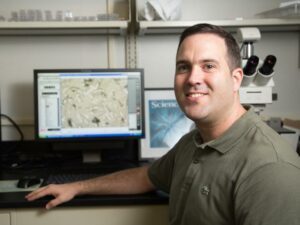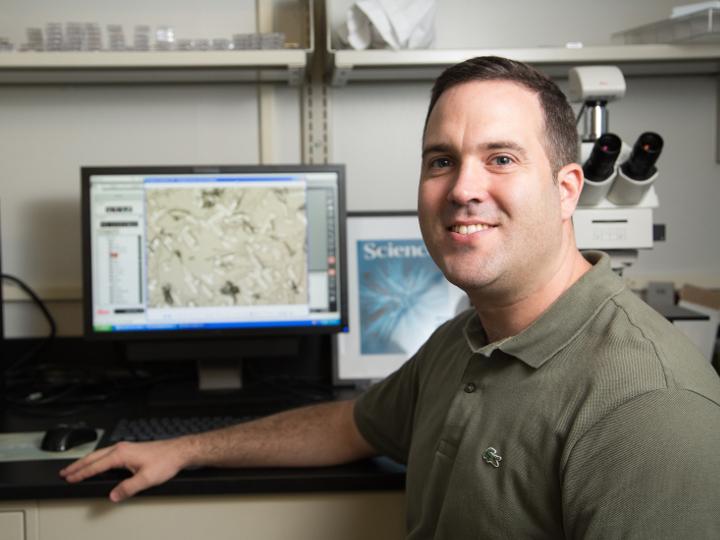
Frontiers in Nanotechnology Seminar Series Presents Jeffrey Rimer from University of Houston
“Establishing New Paradigms in the Design and Synthesis of Nanoporous Zeolites”
 The diverse network of confined pores in zeolites have been widely used for shape-selective catalysis in the (petro)chemical industry. A common objective of zeolite catalyst design is to overcome the inherent mass transport limitations of nanopores; however, the complex pathways of zeolite crystallization make it difficult to control their physicochemical properties.
The diverse network of confined pores in zeolites have been widely used for shape-selective catalysis in the (petro)chemical industry. A common objective of zeolite catalyst design is to overcome the inherent mass transport limitations of nanopores; however, the complex pathways of zeolite crystallization make it difficult to control their physicochemical properties.
In this talk, I will highlight several methods to tailor zeolite crystal size, morphology, and composition to collectively reduce diffusion limitations, thereby enabling the design of catalysts with superior performance compared to materials obtained by conventional synthesis routes. We have discovered new methods to generate 2-dimensional (single layer) zeolites with high external surface area, while also developing methods to passivate external sites via epitaxial growth of coreshells. We will demonstrate how a combination of these two techniques allows for the deconstruction of zeolites with distinct topological features to elucidate the origins of improved catalyst performance (i.e. selectivity and lifetime), which was the subject of a recent investigation into the unique performance of zeolite catalysts in toluene alkylation with methanol.
Additional findings in our group have revealed that coreshell (or zoned) zeolites with Si-rich exterior surfaces can dramatically reduce diffusion limitations, thereby resulting in catalysts that are far superior to analogues with homogeneous distributions of acid sites. We will describe structure-performance relationships of various hierarchical materials, such as self-pillared pentasils exhibiting four-fold increases in lifetime and total turnovers. Lastly, we will introduce a new class of catalysts, finned zeolites, prepared by seeded growth to introduce fin-like protrusions (10 – 40 nm) with identical crystallographic registry as the interior crystal. Examples of 1-, 2-, and 3-dimensional zeolites will be discussed using methanol to hydrocarbons (MTH) and paraffin cracking as benchmark reactions where we employ state-of-the-art techniques such as high-resolution electron tomography, operando spectroscopy, novel acid titration methods, and molecular modeling to correlate structural features of hierarchical zeolites and their diffusion properties with enhanced catalyst performance.
Get to Know Jeffrey
Jeff Rimer holds the Abraham E. Dukler Endowed Chair as a Professor of Chemical Engineering at the University of Houston. With B.S. degrees from Washington University in St. Louis and Allegheny College, and a Ph.D. from the University of Delaware, he furthered his studies as a postdoctoral fellow at New York University before joining the University of Houston in 2009. His research focuses on crystal engineering, aimed at developing materials for microporous catalysts, adsorbents, and therapeutics to prevent disease-related crystal formation.
Rimer is a Senior Member of the National Academy of Inventors and has earned several prestigious awards, including the NSF CAREER Award, the Owens Corning Early Career Award, the FRI/John G. Kunesh Award from AIChE, the Norman Hackerman Award, and the Edith and Peter O’Donnell Award in Engineering. He has also been recognized for his contributions to research, teaching, and mentoring at the university and college levels. Currently, he serves as Director of Graduate Studies, Program Director for the Welch Center for Advanced Bioactive Materials, Associate Editor of Crystal Growth & Design, and holds positions on several advisory boards, including the AIChE Journal and Molecular Systems Design & Engineering.
Frontiers in Nanotechnology Seminar Series Presents Jeffrey Rimer from University of Houston
- This event has passed.
